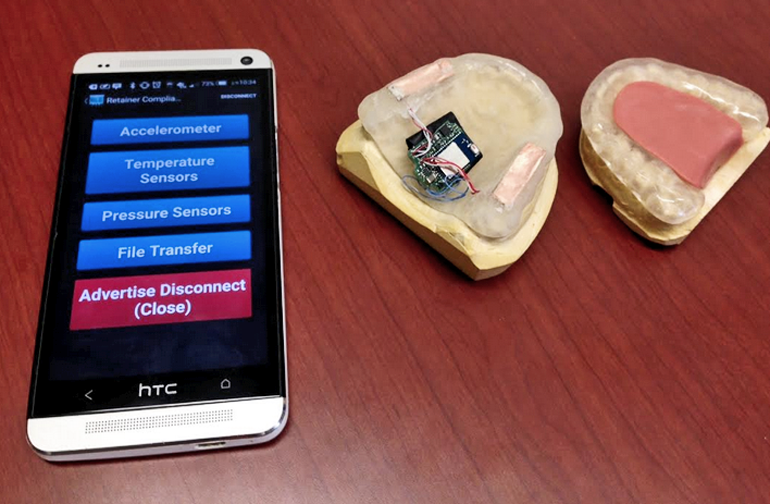A new mouth guard equipped with sensors can tell if you grind your teeth, clue in your dentist, and even help you stop.
What’s more, the next version of the guard, currently under development, may be able to tell when an athlete is becoming dehydrated, overheated, and even whether he or she may have gotten a concussion.
Researchers came up with the idea about five years ago while developing a set of dentures that alert the dentist to an improper fit even if the patient doesn’t complain about it. That got them thinking about something similar that could help an even larger share of the population—people who suffer from bruxism, aka teeth-grinding.
DAMAGED TEETH AND INSOMINA
At least 20 percent of the US population—about 30 million people—suffer from bruxism, which frequently is caused by stress and can lead to damaged teeth, headaches, insomnia, and a sore jaw.
Most people don’t even know they do it—the most common way to diagnose it is for the patient to spend a night in a sleep clinic.
Wouldn’t it be easier and more efficient, researchers thought, for the patient to stay home using a mouth guard equipped with sensors that could detect bruxism, measure how much force was being applied by the jaw, and which teeth were most affected?
“Wearing a mouth guard is less intrusive than spending time in a sleep clinic,” says Fong Wong, associate professor in University of Florida’s Restorative Dental Sciences Department and Craniofacial Center. “It cuts cost when it reduces the number of clinical psychology sessions.”
EXTENDED TREATMENT
The prototype does all of that and can send the information to a computer or smart phone via Bluetooth, where a dentist or orthodontist can retrieve it, make a diagnosis, and suggest treatment.
“That kind of information has been unavailable until now,” says Yong-Kyu “YK” Yoon, associate professor of electrical and computer engineering.
The mouth guard is an improvement over traditional bruxism therapies, such as behavioral modification training during clinical sessions, Wong says.
RELATED ARTICLES
ON FUTURITY
android_1
Duke University
Are your apps spying on you?
girl views a tablet at night
Penn State
Kids sleep better when parents set rules
MF-Tooth_1
Northwestern University
Atomic answer to why teeth are tough
“The advantage is that the guard extends the treatment beyond the time spent in the clinic. This promises greater effectiveness and lower cost.”
One group that could particularly benefit from the smart mouth guard is combat veterans with post-traumatic stress, which can lead to bruxism.
But the smart mouth guard’s potential extends beyond dentistry. The next iteration could be aimed at athletes.
Using different types of sensors, it could detect dehydration or dangerous core body temperature and could measure the strength of a blow to the head, which could give doctors early warning about the possibility of a concussion and alert a coach to pull a player off the field.
Fuente: www.futurity.org
